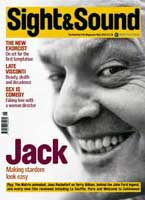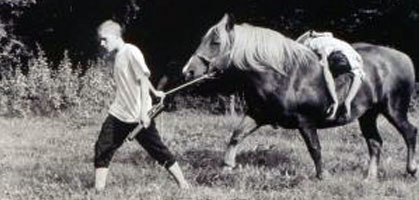
Breathless
Film of the Month: Le Souffle

Le Souffle is a portrait of an angry young man almost too painful to watch, says Ryan Gilbey.
The coming-of-age movie, with its insistence that nothing will ever be the same again after that summer, can be maddeningly simplistic. It typically depends for its impact on the transformative effect of a single plot point, and for its illumination on hindsight softened by nostalgia. Even if first-time director Damien Odoul had not mounted in Le Souffle a string of poetic visual coups that might have made Cocteau swoon, it would still be possible to marvel at how nimbly he sidesteps the traps of the genre to which his film has some tentative allegiance.
With its combination of savage rustic imagery and a bare-bones narrative sketching one boy's stumble towards manhood, Le Souffle could be described as a sheep in wolf's clothing. Shots of animals being culled or dissected prime us, slightly misleadingly, for an essay of the utmost seriousness, such sights being a staple part of the arthouse diet Godard's Week-End, Haneke's Benny's Video, Delphine Gleize's upcoming Carnages. In the absence of plot, here it's often the bodies that tell the story: a boy's belly-button spirals in on itself in close-up like a mysterious seashell, a girl's never-ending legs are as pure and white as a mile of uncrossed beach. The performances, too, have an almost embarrassing naturalism. As the half-surly, half-frolicsome adolescent David, Pierre-Louis Bonnetblanc is so fine he makes you want to avert your eyes; his convulsive dances and tantrums, his boastful incantations ("I represent all the bad boys!"; "I am a wolf!") are too near the knuckle for anyone who has been, known or lived on the same planet as an angry young man.
But the rites of passage in David's story are not forthcoming. Even now, having watched the film twice, I'm not certain he makes it across the border into the adult world. Is there a name for a coming-of-age film which manifestly fails to make good on the genre's one stipulation?
Stranded on his uncles' farm in the remote Limousin region of France, David might well be undergoing a life-altering experience during the balmy day charted by the film. But we are no wiser by the end of it than he appears to be; like David himself, Le Souffle is breathtakingly pretty but largely inscrutable. Repeatedly a chance presents itself for catharsis or epiphany notably in David's interaction with Stef, the wisest and least brutish of the men gathered on the farm for a barbecue that grows closer, with each revolution of the spit, to a sacrificial ceremony. Repeatedly such opportunities go unexploited.
Odoul may even be baiting film-makers who have stuck to the straight and narrow in their journey through the treacherous forest of adolescence. It can be no coincidence that the closest thing the film has to conventional action comes when David looms over a boy's body beside a railway line, just as his American peers did in Stand by Me. The obvious difference is that whereas River Phoenix and chums were related to that body only as spectators, and had their progression into adulthood flagged by setting eyes on it, David is complicit in his discovery the boy is his friend Paul, whom he had shot in the back seconds earlier. Even more radical is the film's denial, or at least suppression, of motive or consequences. David sheds a few tears for his injured friend, but more out of frustration at not being able to hoist Paul on to his disobedient horse.
Even with so much beauty to please the eye, a person will eventually question the purpose of a film in which violence engenders in its perpetrator no apparent emotion, not even pleasure. Is this another River's Edge, another Fun, in which the blank doling out of brutality becomes a symptom of youthful alienation? Not likely. David rips the tailfeathers from a cockerel and lobs stones at a forlorn donkey who might reasonably be wondering if Au hasard Balthazar wasn't punishment enough for his species. The root of the violence, though, is to be found not in David's languid aggression but in the farm's stone banquet room, where the men eat, sweat, lug each other around like dolls and rake over their lives without insight.
Who can predict whether David will be the exception? The film isn't saying. It's pregnant with images of birth and rebirth that point to a maturation process not discernible in his face. In fantasy excerpts, he is naked and dirty, as though he has just tumbled out of the womb. Early on he has his scalp shorn while a sheep's severed head looks on, flies dancing about its grisly grin. This is the only moment in which he looks truly contented, oblivious as he is to the ritualistic connotations of his uncomplicated crop. Of course, we have just witnessed the killing of that sheep, its black blood dribbling noisily into a bucket, as well as the brisk unwrapping of a dead pig whose intestines almost uncoil into our laps. We are, then, better placed to comprehend that David is being primed for sacrifice.
While he is not actually slaughtered by the corpulent farmers, there remains a jabbing, malevolent quality to the day's celebrations that gives the film its sinister kick. You might suspect that the men are nudging their young charge towards intoxication in order to have their wicked way with him, but the scenario is all the more disturbing for its absence of sexual danger. True, there is a scene in which David is jolted out of his stupor with a cup of salty coffee, before being sprayed with a hose. Odoul throws in cut-aways to his tormentors a hairy, distended belly ballooning over a man's trousers; a gummy mouth twisted in laughter; a mutt's leathery tongue unspooling obscenely. It's a horrifying scene: a rape scene, in fact, in all but the letter of the script. But sex very quickly leaks out of the movie. It's almost as though Odoul needed that shocking episode to clear sensationalist thoughts from our minds.
What he saddles us with is something more amorphous and pervasive. If these ghouls were just after David's cherry, their threat to him could be routinely quantified. What they actually want is to make him a man. He is to be inducted into their cannibalistic circle of martyred sons who are regurgitated into irresponsible fathers. One man, Jean-Claude, was shot in the head by his dad. "Ah, memories," he sighs. Pierrot, who is plotting to leave his wife and children, warns David: "Get this into your skull fathers always abandon their sons." David, who is fatherless since his parents' divorce, pastes fond photographs of female relatives by his bed, alternated with snaps of dead animals. But there are no women present in his life here, unless you count the fantasy sequence in which he visits the fairytale house of his supposed girlfriend long enough to enjoy a brief clinch and to cradle his head mournfully in his hands at the sound of her mother's angelic singing, before fleeing through the window of her Rapunzel tower. In a landscape drained of all female influence, it is hardly surprising that the oak tree cleaved into an unambiguously vaginal V comes to seem like the only positive influence in this boy's life.
